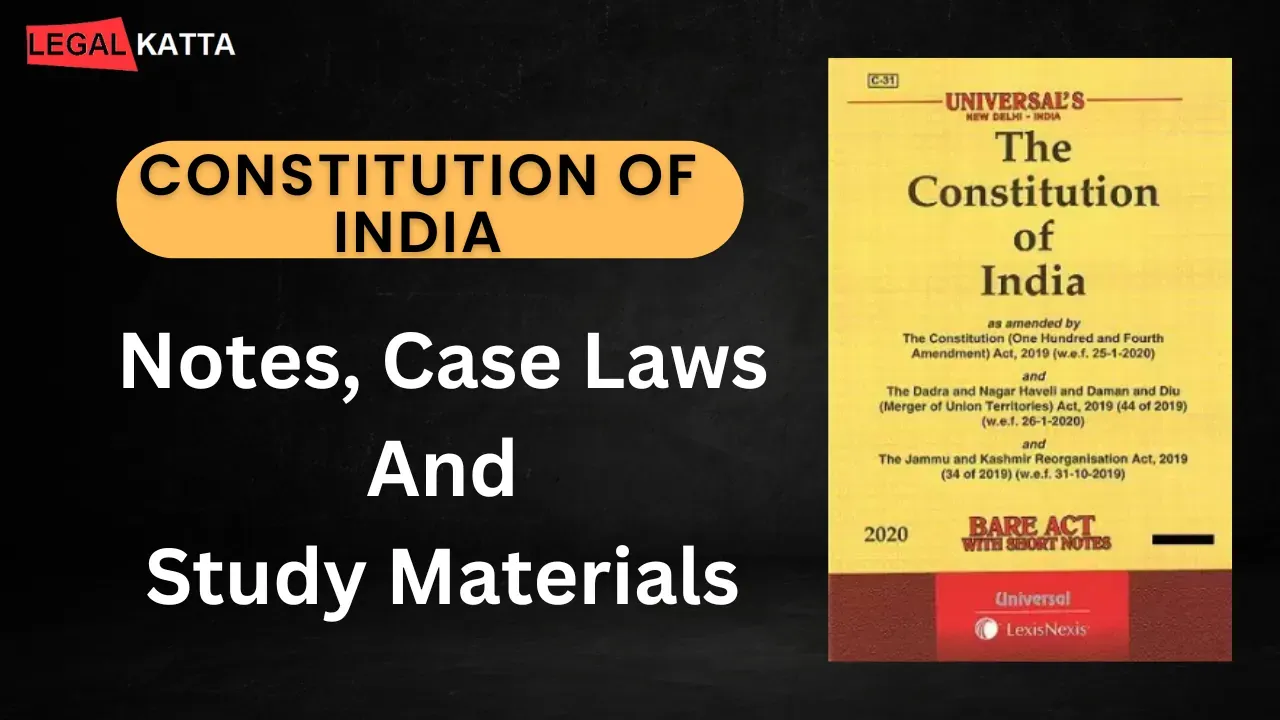 |
| Constitution of India - Notes, Case Laws and Study Materials |
The Constitution of India was brought into force on 26 January 1950. The Original Constitution of India, it consisted of 395 Articles, 22 parts, and 8 Schedules. But at present, the Indian Constitution Consists of 448 Articles, 25 parts and 12 Schedules.
Important study material and case laws on the Constitutional Law – Click on the topics to Read
Module 1 - General Introduction to the Constitution
- Historical Background of Constitution of India
- The Making of the Constitution
- Aims and Objectives
- Salient Features of Constitution of India
- Separation of Powers
- Theory of Basic Structure
- Types of Constitution
- The Preamble of the Constitution
Module 2 - The Union and Its Territory
- Formation of the New States and Alteration of Boundaries
- 100th Amendment - The Land Boundry Agreement with Bangladesh
Module 3 - Citizenship
- Meaning of Citizenship
- Constitutional Rights and Privileges of Citizens of India
- Overseas Citizen of India
- One Citizenship in India
Module 4 - Fundamental Rights and Fundamental Duties
- History of the Fundamental Rights in India
- Classification of Fundamental Rights
- Equality before Law (Art. 14-18)
- Freedom of Speech and Expression (Art. 19)
- Protection in Respect of Conviction for Offences (Art. 20)
- Freedom of Person (Art. 21)
- Right to Education (Art. 21-A)
- Preventive Detention (Art. 22)
- Rights Against Exploitation (Art. 23)
- Prohibition of Employment of Children in Factories (Art.24)
- Freedom of Free Profession, Practice and Propagation of Religion (Art. 25-28)
- Cultural and Educational Rights (Art. 29-30)
- Constitution Remedies (Art. 32)
- Scope of Writs (Art. 32)
- Habeas Corpus
- Mandamus
- Prohibition
- Certiorari
- Quo-warranto
- Power of Parliament to Modify or Restrict Fundamental Rights
- Exceptions to Fundamental Rights
- Scope of Judicial Review
- Fundamental Duties
Module 5 - Directive Principles of State Policy
Module 6 - The Union Executive
- The President and the Vice-president
- Powers and Duties of the President
- The Council of Ministers and their Responsibility
- The Attorney General for India
- The Comptroller and Auditor-General of India
Module 7 - The Union Legislature
- Constitution and Functions of the Parliament
- Composition of Lok Sabha and Rajya Sabha
- Qualifications and Disqualifications for Membership of Parliament
- Speaker, Deputy-Speaker and Chairman, Vice-Chairman
- Bills- Ordinary Bill, Money Bill and Finance Bill
- The procedure of Joint Sitting
- Privileges and Immunity of the Members of Parliament
- The Doctrine of Occupied Field
Module 8 - The State Executive
- Appointment, Powers and Functions of Governer and Advocate General
- The Council of Ministers and their Responsibilities
Module 9 - The State Legislature
- Composition and Functions of State Legislature
- Composition and Powers of Legislative Council and Legislative Assembly
- Qualifications and Disqualifications of Members of State Legislature
Module 10 - Local Government
- The Panchayats
- The Municipalities
- Planning Committee
Module 11 - The Supreme Court
- Constitution of Supreme Court and Appointment of Judges
- National Judicial Appointment Commission (NJAC)
- Impeachment of Judges
- Jurisdiction of Supreme Court
- Concept Curative Petition
Module 12 - The High Court
- Constitution of High Court and Appointment of Judges
- Jurisdiction of High Courts
- Jurisdiction Over Armed Forces and National Green Tribunal
- Control Over Sub-ordinate Courts
Module 13 - Federal System
- Distribution of Legislative and Executive Powers
- Distribution of Financial Power
- Administrative Relation Between Union and State
- Inter-state Relations
Module 14 - Emergency Provisions
- Emergency and Its Classification
- National Emergency
- Failure of Constitutional Machinery in a State (Presidential Rule)
- Financial Emergency
Module 15 - Miscellaneous Provisions
- Amendment of the Constitution
- Rights and Liabilities of the Government and Public Servant
- The Services and Public Service Commission
- Election Commission
- Minorities, Scheduled Caste and Scheduled Tribes
- Languages
